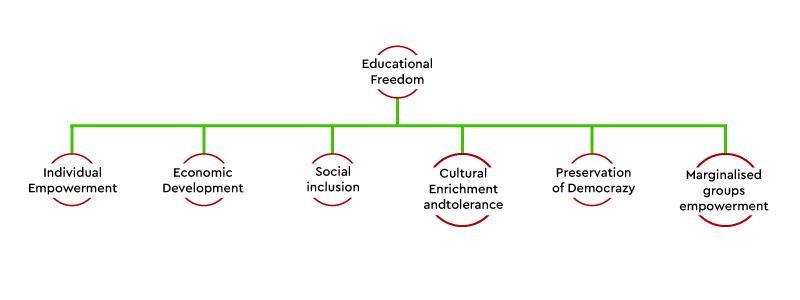Introduction
Education freedom is a cornerstone of modern society, representing people' inherent right to receive and pursue information without unnecessary restrictions. This concept expresses the belief that education should be open to everyone, regardless of background, economic level, or social standing. In this article, we will look at the importance of educational independence, its impact on society, and its effects on personal and societal growth; also, this article emphasizes on the potential transforming capacity of education to empower oppressed people in a variety of ways, assisting them in overcoming obstacles and achieving social, economic, and personal growth.
Defining Education Freedom
Educational freedom refers to unrestricted access to high-quality educational options and the ability to pursue one's selected educational route. It includes the freedom to select the level, type, and topic of education, as well as the right to establish an atmosphere in which individuals can realize their intellectual potential and pursue their passions.

1. Individual Empowerment
A culture that values educational independence empowers its citizens to improve their talents, critical thinking ability, and creativity. Education is a tool for personal development, allowing people to broaden their horizons, question their viewpoints, and become knowledgeable and engaged citizens. It provides people with the knowledge they need to make informed decisions and engage meaningfully in democratic processes.
2. Economic development
Educational freedom is critical to promoting economic development. In a fast-changing global economy, an educated workforce is critical for innovation, productivity, and competitiveness. Individuals who have access to a high-quality education are better positioned to obtain higher-paying job opportunities, contribute to technology developments, and promote entrepreneurship, all of which fuel economic growth.
3. Social Inclusion and Equality
Education is a great tool for social mobility, breaking down barriers and lowering injustices. When education is freely available to all people, regardless of socioeconomic status, it helps level playing field and gives underprivileged people opportunities to overcome systematic obstacles. This helps to make society more inclusive and just.
4. Cultural Enrichment and Tolerance
Educational freedom fosters an environment of tolerance and mutual understanding by enabling the exchange of ideas, knowledge, and cultural experiences. Exposure to varied ideas and beliefs fosters tolerance for different cultures and aids in the fight against prejudice and discrimination. As a result, society becomes more harmonious and united.
5. Preservation of Democracy
A well-informed and well-educated public is necessary for a healthy democracy to function. Education freedom ensures that citizens may critically evaluate information, engage in meaningful conversations, and hold those in authority accountable. It protects citizens from misinformation and propaganda, allowing them to make sensible choices that define the course of their country.
6. Empowering marginalized groups
Education gives marginalized groups a sense of accomplishment and self-worth. Acquiring information and skills enhances their confidence, allowing individuals to confront negative preconceptions and cultural biases that may have held them back in the past. As a result, they are more likely to set lofty goals and overcome hesitation.
Economic empowerment assists underprivileged populations in breaking the cycle of poverty, improving living conditions, and achieving more financial stability for themselves and their families. Education prepares underprivileged people to take on leadership roles and take part in decision-making processes. They may become role models, activists, and spokespeople for their communities through education, ensuring that their opinions are heard, and their perspectives are considered.
Education can challenge established gender roles and customs, which frequently limit prospects for women and gender minorities. Marginalized people can challenge preconceptions, aspire to non-traditional roles, and contribute to gender equality efforts by obtaining an education. Individuals from underprivileged groups who are educated can contribute to the development and upliftment of their communities. They have the ability to offer new ideas, drive economic growth, and launch community projects that address specific concerns in their communities.
Concerns and Considerations
While the concept of educational independence is important, issues such as unequal access, financing inequities, and the effect of prejudiced ideologies must be addressed. Governments, educational institutions, and civil society organizations must work together to ensure that education is used to empower and enlighten people rather than to convert or exclude them.
Conclusion
Educational freedom is a fundamental premise that enables the growth of enlightened, empowered, and wealthy societies. By defending this fundamental right, countries may tap into their members' potential, promote economic progress, social equality, and cultivate a culture of tolerance and democracy. In essence, education is a tremendous weapon for empowerment, allowing marginalized groups to fight prejudices, gain access to opportunities, and make important contributions to society. Societies may unlock the potential of their disenfranchised citizens and create more inclusive, egalitarian, and thriving communities by removing systemic barriers and supporting education for everyone. It is incumbent on governments, educators, and individuals to support and safeguard educational freedom for the benefit of present and future generations.
About the Author
An avid explorer of the realms where science, education, and advocacy intersect, Mr. Lavudiya Ramesh Babu holds a BSc in Life Sciences with a remarkable triple major in Biotechnology, Botany, and Chemistry. Currently pursuing an MSc in Biotechnology at Karunya Institute of Technology and Sciences, Coimbatore. He has published ‘NCERT Simplified Class-6 Science’ book of NCERT simplified series. As a proactive advocate for education, he has orchestrated numerous science awareness initiatives, striving to ignite the spark of curiosity in young minds.